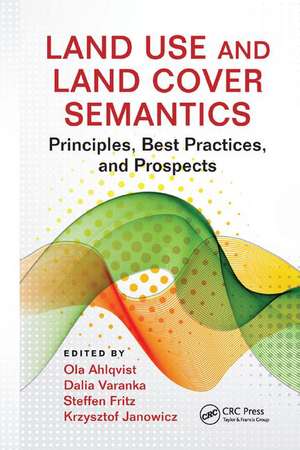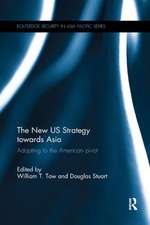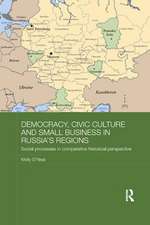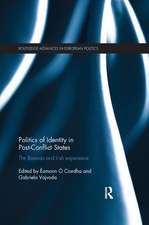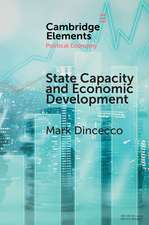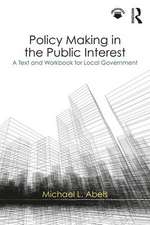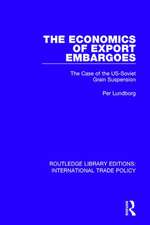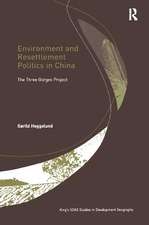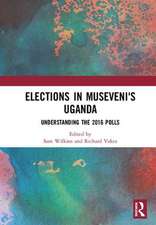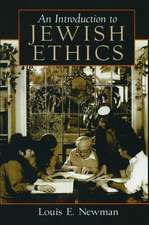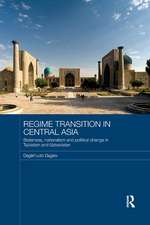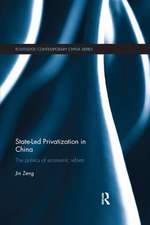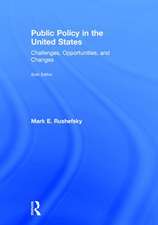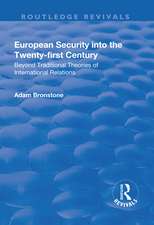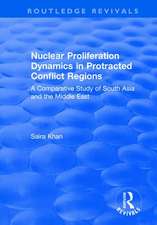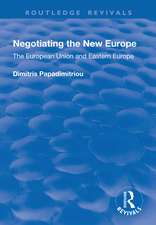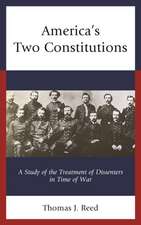Land Use and Land Cover Semantics: Principles, Best Practices, and Prospects
Editat de Ola Ahlqvist, Dalia Varanka, Steffen Fritz, Krzysztof Janowiczen Limba Engleză Paperback – 26 iul 2017
Focused on the information semantics of land use and land cover (LULC) and providing a platform for reassessing this field, Land Use and Land Cover Semantics: Principles, Best Practices, and Prospects presents a comprehensive overview of fundamental theories and best practices for applying semantics in LULC. Developed by a team of experts bridging relevant areas related to the subject (LULC studies, ontology, semantic uncertainty, information science, and earth observation), this book encourages effective and critical uses of LULC data and considers practical contexts where LULC semantics can play a vital role.
The book includes work on conceptual and technological semantic practices, including but not limited to categorization; the definition of criteria for sets and their members; metadata; documentation for data reuse; ontology logic restrictions; reasoning from text sources; and explicit semantic specifications, ontologies, vocabularies, and design patterns. It also includes use cases from applicable semantics in searches, LULC classification, spatial analysis and visualization, issues of Big Data, knowledge infrastructures and their organization, and integration of bottom-up and top-down approaches to collaboration frameworks and interdisciplinary challenges such as EarthCube.
This book:
- Centers on the link between planning goals, objectives, and policy and land use classification systems
- Uses examples of maps and databases to draw attention to the problems of semantic integration of land use/cover data
- Discusses the principles used in a categorization
- Explores the origins and impacts of semantic variation using the example of land cover
- Examines how crowd science and human perceptions can be used to improve the quality of land cover datasets, and more
Preț: 428.68 lei
Preț vechi: 583.19 lei
-26% Nou
Puncte Express: 643
Preț estimativ în valută:
82.03€ • 85.87$ • 67.87£
82.03€ • 85.87$ • 67.87£
Carte tipărită la comandă
Livrare economică 07-21 aprilie
Preluare comenzi: 021 569.72.76
Specificații
ISBN-13: 9781138747999
ISBN-10: 1138747998
Pagini: 360
Ilustrații: 102
Dimensiuni: 156 x 234 mm
Greutate: 0.5 kg
Ediția:1
Editura: CRC Press
Colecția CRC Press
ISBN-10: 1138747998
Pagini: 360
Ilustrații: 102
Dimensiuni: 156 x 234 mm
Greutate: 0.5 kg
Ediția:1
Editura: CRC Press
Colecția CRC Press
Cuprins
Land Use/Land Cover Classification Systems and Their Relationship to Land Planning. Ontology for National Land Use/Land Cover Map: Poland Case Study. The Need for Awareness of Semantic Plasticity in International Harmonization of Geographical Information: Seen from a Nordic Forest Classification Perspective. Parameterized Approaches to the Categorization of Land Use and Land Cover. Eliciting and Formalizing the Intricate Semantics of Land Use and Land Cover Class Definitions. The EAGLE Concept: A Paradigm Shift in Land Monitoring. An Applied Ontology for Semantics Associated with Surface Water Features. Land Type Categories as a Complement to Land Use and Land Cover Attributes in Landscape Mapping and Monitoring. Text Mining Analysis of Land Cover Semantic Overlap . LC: A Spatial-temporal Data Model to Study Qualified Land Cover Changes. Applying Tegon, the Elementary Physical Land Cover Feature, for Data Interoperability. Resolving Semantic Heterogeneities in Land Use and Land Cover. Crowdsourcing Landscape Perceptions to Validate Land Cover Classifications.
Notă biografică
Ola Ahlqvist, PhD, is associate professor of geography at The Ohio State University. He worked professionally with local and regional environmental planning in Finland and Sweden in the 1990s. After completing a PhD in geography at Stockholm University in 2001, followed by postdoctoral training at Penn State University, Ahlqvist joined the Geography Department at The Ohio State University in 2005. His research interests include semantic uncertainty and formal ontology in analysis of land cover change; how online maps, social media, and games form a nexus for spatial collaboration; and the scholarship of engagement in geographic information system and service learning.
Dalia Varanka, PhD, is research geographer at the U.S. Geological Survey and adjunct professor at Johns Hopkins University. After working at the Field Museum of Natural History and the Newberry Library in Chicago, she received her PhD degree in geography from the University of Wisconsin–Milwaukee in 1994. She began her federal career as a physical science technician with the U.S. Bureau of Land Management in Milwaukee. She joined the Mid-Continent Mapping Center, Rolla, Missouri, in 1997 and became a research scientist in 1999. She conducts research in geospatial semantics and ontology and teaches a graduate-level course on that subject.
Steffen Fritz, PhD, is a researcher at the International Institute for Applied Systems Analysis, Austria. He has a master of science in geographical information for development from the University of Durham, UK, and a PhD from the School of Geography at the University of Leeds, UK. As a postdoctoral fellow at the Joint Research Centre (JRC Ispra) Italy, his main focus was to mosaic, harmonize, and produce the Global Land Cover GLC2000 database, but also studied the uncertainties in global land cover. Since 2007, Dr. Fritz has been at International Institute for Applied Systems Analysis (IIASA, Austria), where he became the initiator and driving force behind Geo-Wiki.org a global land cover validation tool based on Web 2.0 and crowdsourcing to reduce uncertainties in land cover and land use in particular. Since 2014 he is group leader of the Earth Observation Systems group within the Ecosystem Services and Management Program at IIASA.
Krzysztof Janowicz, PhD, is an assistant professor for geographic information science at the Geography Department of the University of California, Santa Barbara (UCSB). He is the chair of UCSB’s Cognitive Science Program and one of two editors-in-chief of the Semantic Web journal. Before moving to Santa Barbara, he was an assistant professor at the Pennsylvania State University and a postdoctoral at the University of Muenster, Germany. He is studying the role of space and time for a knowledge organization and is especially interested in geosemantics, geo-ontologies, and geographic information retrieval.
Dalia Varanka, PhD, is research geographer at the U.S. Geological Survey and adjunct professor at Johns Hopkins University. After working at the Field Museum of Natural History and the Newberry Library in Chicago, she received her PhD degree in geography from the University of Wisconsin–Milwaukee in 1994. She began her federal career as a physical science technician with the U.S. Bureau of Land Management in Milwaukee. She joined the Mid-Continent Mapping Center, Rolla, Missouri, in 1997 and became a research scientist in 1999. She conducts research in geospatial semantics and ontology and teaches a graduate-level course on that subject.
Steffen Fritz, PhD, is a researcher at the International Institute for Applied Systems Analysis, Austria. He has a master of science in geographical information for development from the University of Durham, UK, and a PhD from the School of Geography at the University of Leeds, UK. As a postdoctoral fellow at the Joint Research Centre (JRC Ispra) Italy, his main focus was to mosaic, harmonize, and produce the Global Land Cover GLC2000 database, but also studied the uncertainties in global land cover. Since 2007, Dr. Fritz has been at International Institute for Applied Systems Analysis (IIASA, Austria), where he became the initiator and driving force behind Geo-Wiki.org a global land cover validation tool based on Web 2.0 and crowdsourcing to reduce uncertainties in land cover and land use in particular. Since 2014 he is group leader of the Earth Observation Systems group within the Ecosystem Services and Management Program at IIASA.
Krzysztof Janowicz, PhD, is an assistant professor for geographic information science at the Geography Department of the University of California, Santa Barbara (UCSB). He is the chair of UCSB’s Cognitive Science Program and one of two editors-in-chief of the Semantic Web journal. Before moving to Santa Barbara, he was an assistant professor at the Pennsylvania State University and a postdoctoral at the University of Muenster, Germany. He is studying the role of space and time for a knowledge organization and is especially interested in geosemantics, geo-ontologies, and geographic information retrieval.
Recenzii
"The book is a collection of articles written by well-known scientists in Spatial Information Science. The book editors and reviewers led by Dr. Ahlqvist – recognized specialist in the land use and land cover data treatment, provide careful selection and high quality of published material. I find this book to be a timely and helpful resource that gathers many different strands of quality research on increasingly pressing issues around the integrated use of land use and land cover data."
—Sergei Levashkin, Visual Intelligence LP, Houston, Texas, USA
—Sergei Levashkin, Visual Intelligence LP, Houston, Texas, USA
Descriere
As more land cover datasets have been developed, the need to harmonize classification systems for landscape analysis is a frequently proposed solution. This book provides a platform for scholars to reassess the field, affirm successful approaches, and point to future possibilities in advancing LULC semantics. With analysis of land use/land cover semantics and explanations of current best practices, the book reviews aspects of data modeling where designers and practitioners should be aware of providing clear and consistent semantic details.
